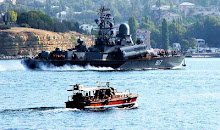MOSCOW—Russia's invasion of Georgia is raising concern that the next flash point may be Ukraine's Black Sea peninsula, the Crimea, an area once part of Russia that still provides a key warm-water port for the Russian Navy.
Moscow's relations with Ukraine have been strained since the 2004 Orange Revolution, in which pro-western Viktor Yushchenko won an election runoff after hundreds of thousands of Ukrainians protested the allegedly fraudulent victory of his Kremlin-backed rival.Like Georgia's western-oriented leader, Yushchenko has been pressing hard and very publicly for his country to join NATO, a move that infuriates the Kremlin.Next week, Vice President Dick Cheney is due to visit Georgia and Ukraine as a high-profile sign of Washington's support.For the Russians, the Crimea is an issue of strategic importance, even more than pride or nationalism. Russia's Black Sea naval fleet is based at Sevastopol, a city located at the tip of the Crimea peninsula.Russia holds a lease to the naval base until 2017, though in recent years Ukrainian politicians have made clear that they are eager for the Russian Navy to pull out.And just as Georgia's leader unwisely challenged Moscow's interests in the pro-Russian South Ossetia enclave, the Ukrainians made a brief but troubling show of standing up to Moscow over its Crimean port.After Russian warships departed Sevastopol for Georgia's Black Sea coast to support the Kremlin's offensive, the Ukrainian administration announced new restrictions on the fleet and threatened to ban the ships from re-entering Ukrainian territory.The Ukrainians backed down, but that is not likely to be the end of the issue. Yushchenko said at Ukrainian Independence Day celebrations on Sunday that Ukraine is vulnerable and should push harder to join NATO."We need to accelerate our accession to the European security system and improve our country's defenses," he said. "Only these steps will effectively guarantee our security and the inviolability of our borders."As a practical matter, the Georgian war is likely to put full NATO membership on hold, probably indefinitely, for Ukraine, as well for Georgia.All along, the European members have resisted Washington pressure to move quickly on their membership, fearful that the western military alliance—with its collective defense obligations—would risk being drawn into conflict with Russia over old territorial disputes festering since the breakup of the Soviet Union.A recent poll by the Kiev International Institute of Sociology of around 2,000 Ukrainians found that 50 percent fear a war with Russia over the presence of the Black Sea fleet in Sevastopol (35 percent said there was no cause for concern).The Crimea, while it has a majority Russian-speaking population, has been under Kiev's at least nominal control since 1954, when Soviet Premier Nikita Khrushchev transferred it from Russia on the grounds that it had better economic and transport links with Ukraine.Russia had won the Crimea from the Tatars in the late 18th century, and Sevastopol assumed a vaunted place in Russian history; many Russian schoolchildren read Leo Tolstoy's short stories about Sevastopol.Today, ownership has become a highly emotive issue. Moscow Mayor Yuri Luzhkov was banned from Ukraine in May after saying that Sevastopol, now a city of 400,000, does not belong to Ukraine.An overreaction, perhaps, but it's a potentially dangerous topic for Ukraine. According to the 2001 Ukrainian census, the most recent, around 60 percent of the 2 million inhabitants of the Crimea are Russian, and around 25 percent are Ukrainian.Last week, Russia denied reports that it has been distributing Russian passports in the Crimea, as it has done in South Ossetia and Abkhazia, two pro-Russian regions seeking independence from Georgia. According to the Ukrainian newspaper Express 24, 15,000 Sevastopol residents, most in the military, hold Russian passports.In Moscow, coverage of Georgia has so far drowned out the rumblings in Ukraine, but some Muscovites are clear where they stand. "No one in my circle—and they're rather well educated—would say the Crimea is Ukrainian territory.You could shoot them, and they wouldn't say it's Ukrainian," said Yelena Kamenskaya, a prosperous Russian teacher. She added: "We all think it's going to be the next trouble spot."As with Georgia, there is the prospect of U.S. involvement. The head of Ukraine's National Security and Defense Council is in Washington this week for talks.And Vice President Cheney is traveling next week to meet with leaders in both Ukraine and Georgia, visits that may embolden Russia's hard-liners. In the wake of Russia's move into Georgia, he declared that "Russian aggression must not go unanswered."Parliamentarians from United Russia, Russia's ruling and virtually only party, see Yushchenko as acting at the bidding of the United States—some going so far as to cite the perceived influence of Cheney even before his trip was announced."It's not democracy when a president carries out the orders of a vice president of another country," said Sergei Markov, a United Russia deputy.Analysts have suggested that Yushchenko is bolstering the specter of a rampaging enemy to boost his own rock-bottom popularity ratings. And considering the common historic and ethnic origins of Ukrainians and Russians—closer than Russians and Georgians—ordinary Russians would have a hard time coming to terms with a war on Ukraine, says Fyodor Lukyanov, editor of the magazine Russia in Global Affairs."An armed conflict between Russia and Ukraine would be a catastrophe. The two peoples are so close that, from a moral point of view, it's horrifying."
Subscribe to:
Post Comments (Atom)









No comments:
Post a Comment